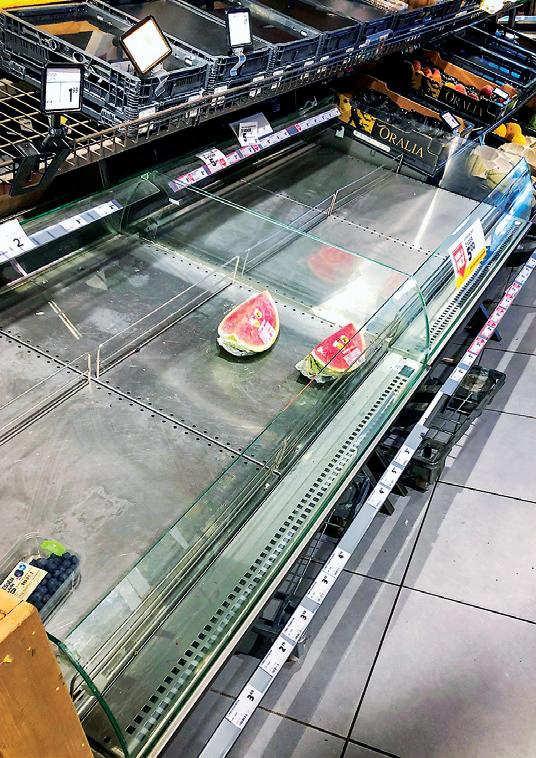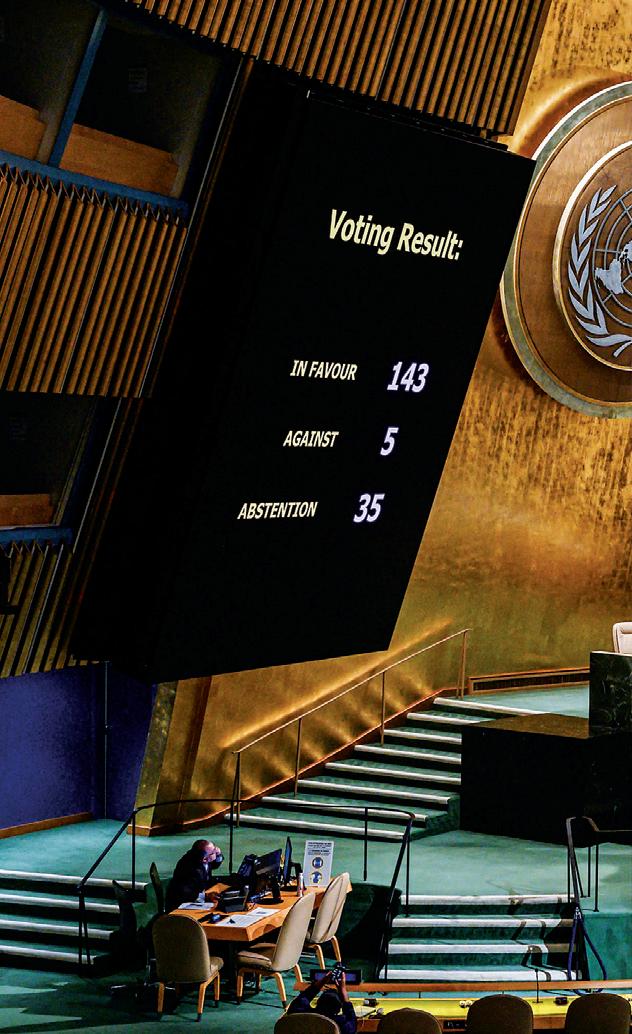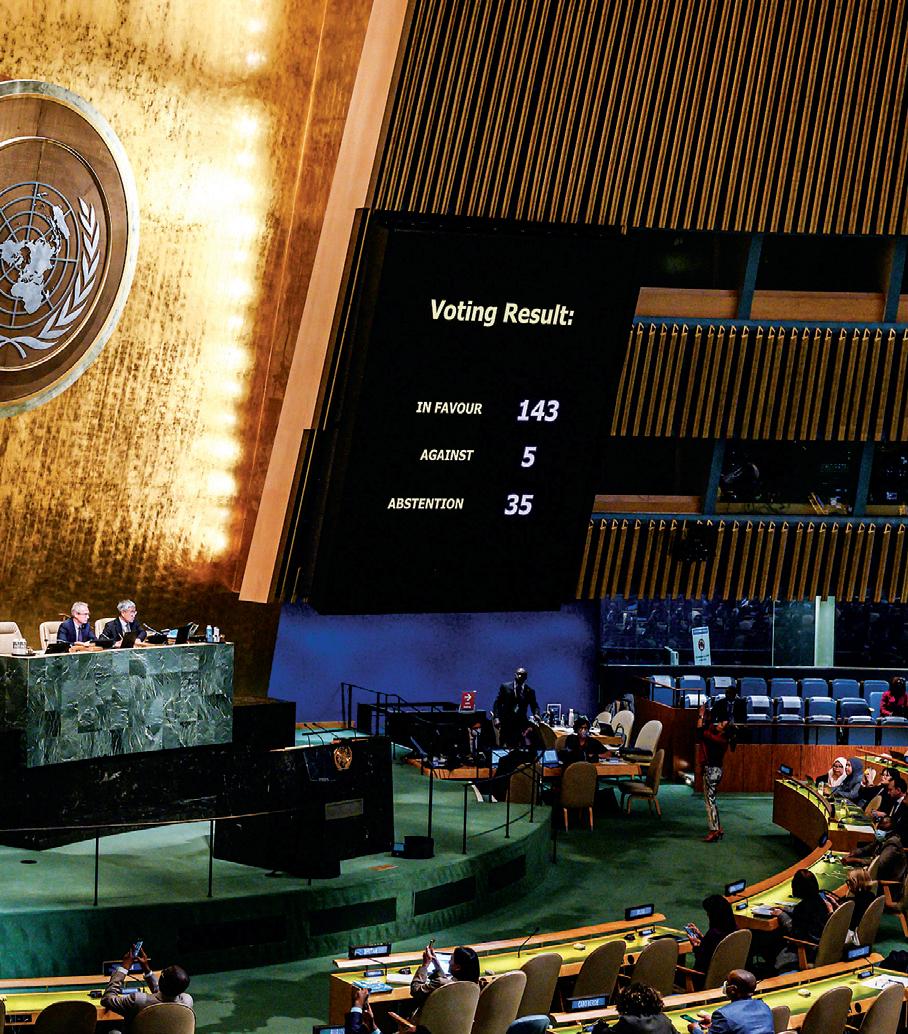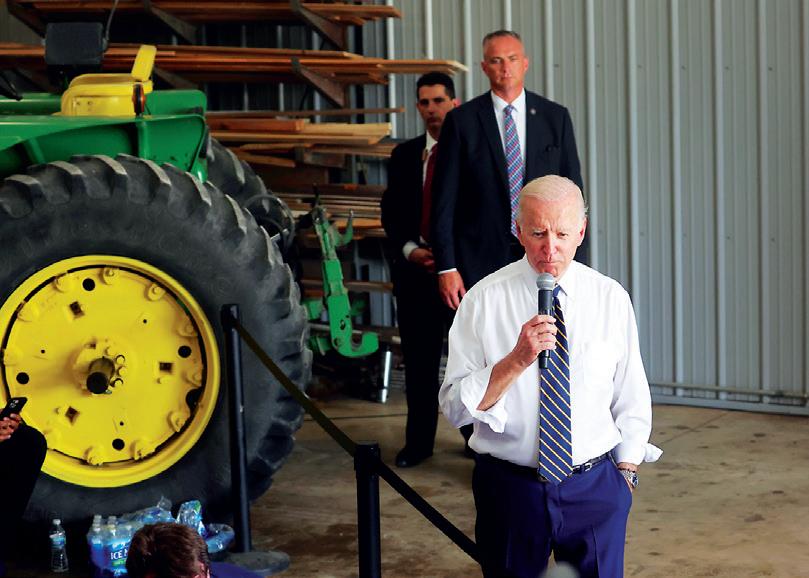
14 minute read
Famine Fears
The effects of what critics have described as a global “war” on farmers and ranchers are becoming more apparent. But even as food shortages intensify, governments, including the Biden administration, are cracking down harder on agricultural production.
Experts and lawmakers who spoke to The Epoch Times warned that it’s time to rein in government policies that are harming the poor the most. A Republican congressman said a Republican-led Congress would begin work immediately upon taking control.
While the attacks on agriculture and related industries look different in different nations, many experts say it’s a coordinated global policy being promoted by the U.N., the World Economic Forum (WEF), the European Union, and other international forces determined to transform civilization.
In July, The Epoch Times published an in-depth investigative piece citing multiple professionals in the field who said U.N.-backed policies on climate change and sustainable development, which they described as a “war on farmers,” were directly responsible for the escalating food crisis.
The result of the policies targeting agricultural
Empty shelves in a supermarket, due to delays in truck deliveries during protests by farmers and truckers against government policies, in the Netherlands on July 5. producers is starting to become clear, with food shortages becoming more acute around the world. Think Sri Lanka, but on a global scale—at least if current trends continue.
U.N. leaders and Western officials are discussing it openly. President Joe Biden, for example, citing the conflict in Ukraine, warned earlier this year that “real” food shortages were coming soon.
U.N. World Food Program Executive Director David Beasley has been warning since the start of the COVID-19 crisis of “devastating” global food shortages that could lead to a famine of “biblical proportions” in dozens of nations.
“The world must open its eyes to this unprecedented global food crisis and act now to stop it spinning out of control,” he said last month at a World Food Day event hosted by a U.N. agency led by a member of the Chinese Communist Party (CCP).
In fact, with farmers and ranchers under growing regulatory pressure, numerous authoritative sources are warning that even wealthy countries such as the United States could start seeing supply-chain issues in food and other critical sectors in the months ahead.
Suffering in Europe
In Europe, the cracks in the system are starting to show. Already, an increasing number of items are missing from supermarket shelves as prices skyrocket. In the UK and Germany, escalating shortages at stores have made headlines for weeks.
Numerous nations around the world—especially in the Middle East and Africa—are already facing major food crises. And with U.N.-backed “sustainable” policies by governments and the financial industry decimating energy systems and agricultural production, the pain is likely to increase, experts say.
It’s especially hard on the poor, according to Dr. E. Calvin Beisner, president of the Cornwall Alliance for the Stewardship of Creation and a leading Christian authority on environmental issues.
He blasted anti-farming policies supposedly aimed at fighting climate change.
“Banning or reducing the use of nitrous fertilizers in the name of fighting global warming is nonsense,” Beisner told The Epoch Times, pointing to policies pursued by governments around the world in response to U.N. advocacy.
“Nitrous oxides are a bit player in the overall greenhouse effect, overshadowed hundreds of times by carbon dioxide and thousands by water vapor.
“The infrared wavelengths at which nitrous oxides absorb are almost completely absorbed already. Hence, they can contribute only an insignificant amount to global warming.

“But their contribution to human well-being is immense, as they multiply crop yields per acre, per hour of labor, and per input of capital, making food more abundant and less expensive for everyone. The poor benefit more from them than anyone.
“The war on farmers is a war on the poor.”
War on Farmers
The war on farmers has been observed clearly in Holland, Sri Lanka, South Africa, Canada, and many other nations—even in the United States. In public, pretexts for the policies include saving the planet from alleged man-made climate change, dealing with various other environmental issues, improving economic efficiency, and even giving lands to “indigenous” people. But critics say the true motivation seems to be much darker.
The ultimate goal of powerful international actors, according to the international organizations, such as WEF, behind many of the policies resulting in food insecurity, is to restructure every element of life on Earth.
From rethinking private property rights to drawing up a “new social contract,” everything must be transformed, WEF founder Klaus Schwab and his organization have argued for years while promoting what they refer to as the “Great Reset.”
But not everybody is on board.
The Ranchers-Cattlemen Action Legal Fund United Stockgrowers of America, known as R-CALF USA for short, represents cattlemen and ranchers across the nation. The group A tractor with an agricultural implement attached drives across a parched field near Beelitz, Germany, on Aug. 18.
Rep. John Rose
is sounding the alarm about the dangers of the U.N. and WEF agenda.
“What’s happening is the globalists have an agenda that can best be effected by targeting the low-hanging fruit,” R-CALF USA CEO Bill Bullard told The Epoch Times, saying that the trend was obvious when the Dutch government declared war on that nation’s farmers.
“What they’re doing is targeting the segment of the agriculture industry least capable of absorbing these additional regulatory costs. When governments impose these policies, those that can withstand these added costs are the large agribusinesses, not the little guys.”
Bullard said that “this is an attempt to eliminate independent farmers and ranchers around the world” and that governments and international organizations were working together in the effort.
“Cattle producers and farmers and ranchers are the front line; they are being targeted because they’re easy to remove,” he said.
Pointing to numerous Biden administration policies targeting farmers, Bullard said that if this isn’t stopped, “we will see farmers and ranchers dropping like flies.”
The end goal is to “further the consolidation and centralization of food production by transnational global elitists—international tribunals, the World Economic Forum, and all the rest of them.”
“All this originates with the U.N. sustainable agenda, Agenda 2030, Agenda 21, and multinational corporations all involved in influencing and working with the U.N.,” he said.
The president of R-CALF USA, Brett Kenzie, also chimed in, saying that “global elites” were pushing “sustainability,” which he described as “the latest denomination of false idol worship that should put the fear of God into us all.”
“All they want is everything, and your ability to generate a living with your private property will be their first victim,” Kenzie said.
UN-Backed Policies
Indeed, as The Epoch Times reported in a recent article headlined “UN, World Economic Forum Behind Global ‘War on Farmers’: Experts,” a number of U.N. Agenda 2030 “Sustainable Development Goals” are directly linked to the global war on farmers.
The goals, which were developed with help from the CCP and have been adopted by governments worldwide, call for drastic changes in agriculture, production, and even consumption. They have been regularly cited by governments in developing the very policies that many knowledgeable parties blame for the food crisis.
The WEF signed an official “strategic partnership” with the U.N. designed to bring major businesses around the world into the movement to impose Agenda 2030 goals on the planet.
The text of the deal promises to “deepen institutional engagement and jointly accelerate the implementation of the 2030 Agenda for Sustainable Development.”
U.N.-backed government policies targeting the energy sector are also playing a major role in the developing food shortages, experts said.
For instance, Europe’s efforts to phase out reliable power sources including hydrocarbon energy and nuclear power have produced devastating effects on European industry.
Especially hard hit has been fertilizer production, a critical agricultural input. Due to soaring fertilizer prices, food production has been compromised as food prices surge higher worldwide.
In the United States, the Biden administration, the bureaucracies, and Congress have also been targeting agriculture and energy.
The Inflation Reduction Act, for instance, will see taxpayers pay farmers to not farm, under


The U.N. headquarters in New York on Oct. 12. Multiple experts have said U.N.backed policies on climate change and sustainable development were directly responsible for the escalating food crisis. the guise of implementing “climate-friendly” agricultural crop rotation.
The Securities and Exchange Commission (SEC) has also angered farmers nationwide with a proposed regulation that would force them to track emissions if they do business with a publicly traded company.
It’s not just government. Major banks and investment managers around the world have also signed on to U.N. policies contributing to the food crisis.
In fact, a coalition of 19 attorneys general from mostly Republican states is investigating possible collusion between the six largest U.S. banks and the U.N.’s “Net-Zero Banking Alliance.”
As participants in the U.N. program, the banks agree to pursue “net-zero” emissions by 2050 by ending, or radically scaling back, investment and lending to traditional energy producers and agricultural interests.
Multiple state attorneys general involved in the investigation told The Epoch Times that this “collusion” by U.S. banks with the U.N. was undermining American agriculture and industry while benefiting the CCP.
“Our own money is being weaponized against us,” West Virginia Treasurer Riley Moore told The Epoch Times in August, as he moved against the mega banks for targeting key industries.
Congress Getting Involved
U.S. lawmakers have also become increasingly concerned about the targeting of agricultural producers with government policy and pressure from financial-service providers.
U.S. Rep. John Rose (R-Tenn.) owns and operates a farm that has been in his family for more than 230 years. He also served as agriculture commissioner in Tennessee before being elected to Congress in 2012.
Concerned about regulatory overreach impacting farmers and the “very real threat of food shortages,” Rose organized fellow congressmen to make their voices heard.
In the first letter to the SEC chief, Rose and more than 115 members of Congress called for the agency to reject the “significant and unworkable regulatory burden” being proposed for the agricultural community.
In the second letter, Rose and almost all Republicans on the House Committee on Financial Services pointed to the recent Supreme Court ruling against the Environmental Protection Agency (EPA) establishing emissions caps on power generation as evidence that the SEC lacked the authority to move forward.
In an interview with The Epoch Times, Rose said that when Republicans retake the House, they intend to unleash “aggressive” oversight and rein in the regulatory abuses targeting agriculture and other sectors.
“I don’t think these policies are necessary or appropriate,” he said, noting that there was a nexus with the U.N. agenda and that the pressure being put on farmers was “very worrisome.”
“We see the Biden administration using regulatory muscle to effectuate this green agenda through overreach.”
In addition to the SEC’s proposal on emissions reporting that will crush small farms, Rose pointed to Biden administration efforts to expand federal control of water resources by broadening the definition of “Waters of the United States.”
“The EPA has been taking very aggressive steps with respect to necessary crop protection tools farmers use, even suspending access after farmers have purchased supplies,” Rose said. “That’s not helpful.
“I’ve dealt directly with farmers who are being harassed using regulatory overreach that previous ‘Waters of the United States’ policies
World Economic Forum founder and Executive Chairman Klaus Schwab speaks with Chinese leader Xi Jinping remotely at the WEF’s headquaters in Cologny, Switzerland, on Jan. 17. The goals of the international forces were developed with help from the CCP and have been adopted by governments worldwide.

during the Obama years had given to federal agencies. It’s really having a deterrent effect on agricultural production.”
The end result of these types of policies against farmers, he said, will be “continuing shortages and deterred production around the world.”
It’s all “self-inflicted,” too, the congressman noted.
“We have to take stock of the fact that we can’t implement policies that will lead to shortages of something as important as food,” he said, calling that “obvious” and noting that farmers must continue feeding the world.
“This is all a formula for famine around the world.”
The same is true in the energy sector, Rose said, pointing to policies deterring the exploration and development of resources.
“It doesn’t make sense to have our head in the sand on these issues,” he said.
“Everybody’s concerned about the environment, but this religious zeal where they’ve turned green concerns into a mantra to live by is a big mistake.”
But if Republicans take control of both houses of Congress in January, “we will see a decidedly focused effort to conduct appropriate oversight of the Biden administration and various regulators, including in financial services,” according to Rose.
“We will have strident, forceful oversight,” he said, noting that transparency and reining in abuses would be a key focus and that legislation and leverage with funding could be possible tools to stop the administration from “intentionally harming” the U.S. economy and agriculture in particular.
“You will see aggressive moves on all those fronts. Ultimately, tremendous pressure will be brought to bear.”
Foreign allies should be “encouraged” to not make the same sort of policy “mistakes” Biden is making, which lead to food and energy shortages, according to Rose.
“The productive capacity to feed the world is there—in fact it’s growing every year. We have proven we can feed the world,” he said. “But in order to do that, we have to move forward, and we can’t tie a hand behind our back, which is what Biden and many of the international folks interested in green initiatives are trying to do.
“Maybe that’s what they want. One of the most common questions I get from voters is, ‘What’s the hidden agenda?’
“People understand that if you don’t produce

oil and don’t have a substitute, what happens? You get brownouts, blackouts like California; requests to not charge your car. That’s not practical. The economic ripples that creates lead to things like shortages, including in food. We can’t have that.”
Responses from Biden, UN
As the food shortages become more acute, Western political figures including Biden have already offered some strong hints about how they’ll respond.
For instance, in the face of soaring energy prices that experts say were caused by his policies, Biden—sounding more like a Venezuelan strongman than a U.S. president—repeatedly blamed companies for “profiteering.”
In response to fertilizer shortages, U.S. Agency for International Development Administrator Samantha Power celebrated what she called a “silver lining.”
“Fertilizer shortages are real now,” she said on ABC News. “As a result, we’re working with countries to think about natural solutions like manure and compost, and this may hasten transitions that would have been in the interest of farmers to make eventually.”
Sri Lankan farmers tried that in response to a U.N.-backed ban on fertilizers by the socialist government there, and it ended in disaster.
Ironically, the U.N., which has long been supporting climate and sustainable development policies that experts blame for the food-supply issues around the world, is now presenting itself as the answer to the crisis.
“The international community has a good sense of how to tackle the food crisis; what we need now is coordinated government action,” said Michael Fakhri, the U.N. “special rapporteur on the right to food,” in a statement portraying the U.N. and governments as the solution to the problem that experts say they caused.
Fakhri also called on governments to “set the right conditions for a transition to agroecology.”
U.N. Secretary-General António Guterres, a former leader of the Socialist International, has also sounded the alarm about what he described as the “global food crisis.”
Speaking at an event last month that was hosted by U.N. Food and Agriculture Organization chief Qu Dongyu—a member of the CCP and former official for the regime in Beijing—Guterres said 3 billion people today can’t afford a healthy diet.
“The number of people affected by hunger has more than doubled in the past three years,” he said, noting that “almost a million people are living in famine conditions, with starvation and death a daily reality.
“Governments, scientists, the private sector, and civil society need to work together to make nutritious diets available and affordable for all.”
The U.N. and the organization’s relevant agencies didn’t respond to requests for comment by press time. President Joe Biden speaks to guests gathered at the O’Connor Grain Farms in Kankakee, Ill., on May 11. The Biden administration and Congress have been targeting agriculture and energy in the United States.








